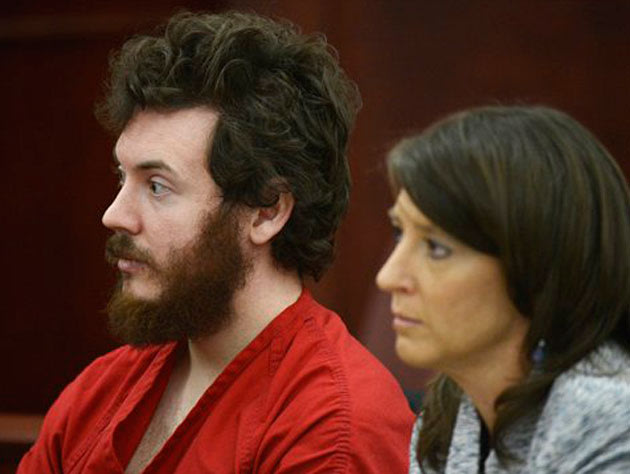 James Holmes sits with defense attorney Tamara Brady during his arraignment. (AP)
James Holmes sits with defense attorney Tamara Brady during his arraignment. (AP)
CENTENNIAL, Colo.?James Holmes, the man accused of murdering 12 people in last summer?s shooting spree at a suburban Denver movie theater, has asked a judge to let him change his plea from not guilty to not guilty by reason of insanity.
A judge will decide whether to approve the plea change before May 31. The plea is seen as the suspect's best shot at avoiding the death penalty, but it's unclear whether Holmes has the right to make the change under Colorado law. If his request approved, Holmes will have to undergo lengthy psychological tests to back up his claim.
On Tuesday, Holmes? lawyers notified the court they plan to pursue the insanity defense. Since Holmes' first hearing in July, attorneys on both sides have repeatedly peppered courtroom argument with their perceptions of his mental state. Two statements from attorneys boil down just how far apart they are:
"Because he wanted to kill all of them, he knew what he was doing," prosecutor Karen Pearson said during Holmes? arraignment.
"Mr. Holmes suffers from a serious mental illness," his defense wrote in a court filing on April 29.
Here?s a look at some milestone events that led up to today?s likely plea:
? During the March 12 arraignment, William Sylvester, the first judge in the case (the judge is now Carlos A. Samour), entered a not-guilty plea on the defendant?s behalf, as allowed by law. The court expected Holmes to plead not guilty by reason of insanity at the arraignment, but defense attorney Daniel King told Sylvester the defense was trapped in what he called a legal Catch-22: Because they didn?t know whether the prosecution would seek the death penalty, they couldn?t enter an appropriate plea?guilty, not guilty, insane or otherwise. (Arapahoe County District Attorney George Brauchler said in court on April 1 he would seek the death penalty, putting in motion today?s plea.)
? The day before the arraignment, Sylvester, who has since stepped down from the case because his schedule won?t permit a lengthy capital case, advised Holmes what an insanity plea legally entails. In a court notice, Sylvester wrote that the test for insanity applies to a ?person who is so diseased or defective in mind at the time of the commission of the act as to be incapable of distinguishing right from wrong.? But a legally insane person is not someone with ?moral obliquity, mental depravity, or passion growing out of anger, revenge, hatred, or other motives and kindred evil conditions.?
That?s the key difference, prosecutors allege: While fully sane, Holmes meticulously concocted a ?detailed and complex? plan to slaughter patrons at the Aurora movie theater.
? In the week leading up to the arraignment, Holmes? attorneys publicly announced through a court filing that he offered to plead guilty and avoid trial. But the prosecution not only turned down the request, it chastised Holmes? lawyers, dubbing the proposal a ?calculated attempt? to ?deliberately prejudice the public, witnesses, and victims? against the prosecution?s case.
?[The guilty offer] was not only improper, but grossly improper,? the prosecution said, adding that a guilty plea only proved ?that the defendant knows that he is guilty, the defense attorneys know that he is guilty, and that both of them know that he was not criminally insane.?
? In hearings during the late summer and fall, the defense tried to establish that Holmes? relationship with his university psychiatrist, Dr. Lynne Fenton, continued until the July 20 shootings, and possibly afterward. This apparently was an attempt to prove he was still under mental health care?and, thus, his conversations with her are confidential. (Holmes' insanity plea may remove that confidentiality, and allow the state to administer mental health tests and delve deeper into Holmes' illness. Defense attorneys have objected to this.)
Meanwhile, the prosecution asked several law enforcement witnesses during testimony to detail the weapons arsenal Holmes amassed. The array of ammunition and body armor?in addition to the booby-trapping of his apartment?illustrates a sane and well-crafted plot, the prosecution has implied.
Holmes, 25, was a Ph.D. student in neuroscience at the University of Colorado before the shootings during a midnight showing of "The Dark Knight Rises," the latest Batman movie. He faces 166 counts of murder, attempted murder and other charges. The trial is scheduled for February 2014.
But victim Marcus Weaver said there shouldn't even be a trial. Because Holmes already offered a guilty plea, Weaver told Yahoo News at the April 1 hearing that he'd rather not see a months-long trial and that Holmes should and own up to his mistakes.
"It's anguishing. It's frustrating as a victim," Weaver said. "You're talking a whole calendar year before you get to a trial."
He added, ?You have an obligation, if you?re guilty, to plead guilty."
--The Associated Press contributed to this report.
Source: http://news.yahoo.com/blogs/lookout/james-holmes-insanity-plea-expected-today-074731811.html
Harlem Shake Miami Heat dr seuss mariah carey History Channel The Bible alex smith alex smith The Bible History Channel
কোন মন্তব্য নেই:
একটি মন্তব্য পোস্ট করুন